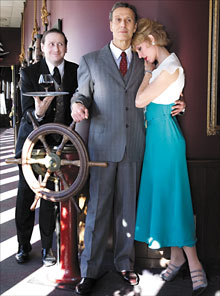 The SS Italian Castle is almost absurdly gorgeous. With its sleek and imposing height, its glowing portholes peeking into sumptuous Art Deco cabins, and the huge full moon hanging above its deck, this luxury ocean liner seems over-the-top, too dramatic to be true. And that is exactly as it should be. Caricature is the currency of both setting and sensibility in Tom Stoppard’s comedy Rough Crossing, and Michael Rafkin’s smart, handsome production (for Portland Stage Company) spends it with delightful decadence.
The SS Italian Castle is almost absurdly gorgeous. With its sleek and imposing height, its glowing portholes peeking into sumptuous Art Deco cabins, and the huge full moon hanging above its deck, this luxury ocean liner seems over-the-top, too dramatic to be true. And that is exactly as it should be. Caricature is the currency of both setting and sensibility in Tom Stoppard’s comedy Rough Crossing, and Michael Rafkin’s smart, handsome production (for Portland Stage Company) spends it with delightful decadence.
The passengers aboard the SS Italian Castle, a crew of theater people en route from England to New York to stage an unfinished new musical, are also impossibly archetypal. They are burlesques of late ’20s theater personalities: The play’s writers — the elegant Turai (Robert Boardman) and the bumbling Gal (Daniel Noel) — are a quintessential odd coupling of brains and credulity as they scramble to finish the script. The blonde leading lady, Natasha (Marcy McGuigan), is statuesque and exotic. Her shy young lover, Adam Adam (Bryant Richards), is a troubled composer with a speech problem, while her rakish stage (and former real-life) lover, Ivor (David Edwards) pursues her with will and arrogance. When Adam and the writers overhear Natasha and Ivor mid-tryst, histrionics flare and the play — which is, of course, the thing — seems doomed. That is, until Turai’s scheming writer-brain hatches a plan to let art imitate, and thereby rehabilitate, life.
There to help out with both art and life — providing both exposition and the endless cognacs it seems to warrant — is the glib harlequin of a ship steward, the unflappable Dvornichek (Mark Honan). This is Stoppard’s wise fool, the center of much of the verbal slapstick that pervades Rough Crossing. In local veteran Honan’s capable hands, Dvornichek breezily, blusterously keeps us reminded of both our role as audience and the artifice of the whole endeavor. He addresses us in asides, comments on the action, and bursts on stage with impossible omniscience.
The characters whom he so serves are, like their breathtaking setting, at once themselves and send-ups of themselves. Under Rafkin’s effusive direction, this excellent all-Equity cast poses, mugs, and dramatically climbs octaves and decibel levels. McGuigan’s Natasha is everything a stage diva should be, all melody, temperament, and charm; her former paramour, in the hands of Edwards, is a well-preened and huffy bantam rooster. Richards, as the tortured Adam, plays with a diverting range of physical comedy, from fearful twitching (at the mention of his mother) to exaggerated expressions of woe. The writing team is a delicious study in opposites with the angular Boardman as Turai, sleek, sly and vain, and the portlier Noel, who gives Gal a beaming naivete and exuberance. Although bits of Stoppard’s wit were sometimes buried in the rich stuff of accent and bluster on the night I attended, the timing of these actors — difficult, crucial — is impeccably directed and executed.